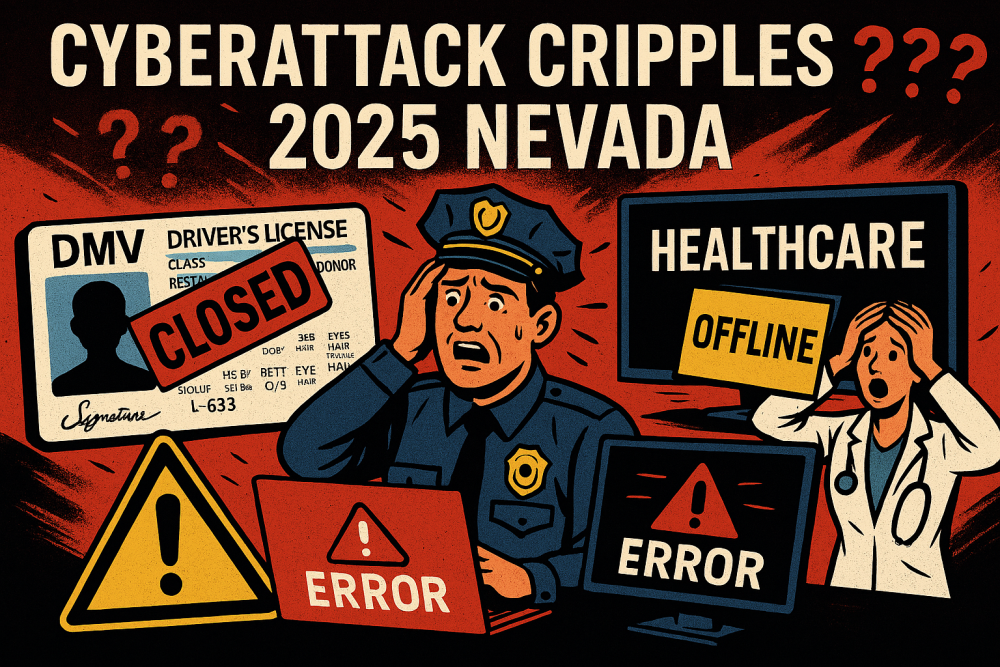
Why Cybersecurity Is No Longer Optional for Business, Healthcare, and Government Organizations
By Leo Bletnitsky, President & MSP CEO
Imagine waking up on a Monday morning, ready to renew your driver’s license, file a business permit, or check your Medicaid status—only to discover that the entire state of Nevada has gone digitally dark. DMV offices? Closed. State websites? Offline. Law enforcement databases? Unreachable.
This isn’t a dystopian Netflix plot. It’s real life in 2025. Nevada was hit by a massive cyberattack—and the fallout was immediate and far-reaching.
As an MSP CEO who works closely with healthcare organizations and businesses to strengthen their cybersecurity posture and ensure their technology works, I can tell you: this is the kind of breach that makes IT professionals cry in their coffee… or tequila. But more importantly, it’s a wake-up call for every executive, business owner, and government leader who still thinks cybersecurity is just a “tech issue” or an “unnecessary expense.”
Let’s unpack what happened, why it matters, and what you should be doing—before your own systems become the next casualty.
The Breach Heard 'Round the Silver State
On Sunday, August 24, Nevada’s state government reported a “network security incident.” Translation: hackers infiltrated critical systems—and they weren’t just browsing. By Monday, in-person services, websites, and phone lines across multiple agencies were shut down, including:
- DMV
- Department of Public Safety
- Health and Human Services
- The Funeral Board
While emergency services like 911 remained operational, the disruption was widespread. Law enforcement couldn’t access DMV records and other states don't have access to criminal records. Welfare offices couldn’t process food stamp applications. Medicaid enrollment systems were offline. Thousands of residents were left wondering if their personal data had been compromised.
Spoiler alert: it probably was. Officials later confirmed that data had been “exfiltrated”—cybersecurity-speak for “the bad guys took our/your stuff.”
Ransomware: The Digital Stick-Up
Although Nevada hasn’t officially confirmed it, all signs point to a ransomware attack. That’s when hackers encrypt your systems and demand payment to unlock them—like a digital mob shaking down your servers.
Ransomware attacks are surging, especially against state and local governments. Why? Because they hold vast amounts of sensitive data and often rely on outdated infrastructure. It’s like robbing a bank that uses stern signs instead of vaults and security guards. Keep in mind that if they compromised the state who has teams working on security, how secure is your 25 or 250 person organization?
Healthcare: The Hidden Casualty
When state systems go down, it’s not just about DMV appointments—it’s about Medicaid payments, insurance verification, prescription databases, workers’ comp systems, and public health records.
In Nevada’s case, some Medicaid services remained operational, but others were inaccessible. For healthcare providers, this kind of disruption can delay patient care, billing, and compliance. And for healthcare businesses, it raises serious concerns about HIPAA violations and breach notifications.
Cybersecurity isn’t just about protecting data—it’s about protecting lives.
Why This Should Terrify (and Motivate) You
If you’re a business owner or executive, here’s the uncomfortable truth: you’re next. Not “maybe.” Not “someday.” If you have data, you’re a target.
And if you think your part-time IT guy or your cousin who took a few tech classes can handle it, you’re living in a fantasy.
Here’s what the Nevada breach teaches us:
- No one is too small to be hacked. State governments, small businesses, nonprofits, your pediatrician—everyone’s fair game.
- Downtime is expensive. Nevada’s outage has lasted days, with recovery likely stretching into weeks or months. What would that cost your business?
- Data is currency. Hackers want your employee records, customer data, financials, and intellectual property.
- Recovery is slow and painful. It’s not just a reboot—it’s a forensic investigation, a rebuild, and a PR nightmare.
Cybersecurity: The New Business Essential
So what can you do? Here’s your executive-level checklist:
- Get a Cybersecurity Assessment
If you haven’t had one in the past year, you’re overdue. An MSP (like mine!) can help identify vulnerabilities before hackers do. - Implement Multi-Factor Authentication (MFA)
Yes, it’s annoying. But it’s one of the simplest and most effective ways to prevent unauthorized access. - Train Your Staff & Use a Password Manager
Your employees are your biggest risk. Phishing emails are getting smarter—make sure your team is too. - Back Up Everything
Offsite, encrypted, and tested regularly. Backups are useless if they don’t work when you need them. - Have a Response Plan
If you get hacked, what’s your plan? Who do you call? What do you tell customers? If your answer is “I don’t know,” we need to talk. - Get Cyber Insurance
It can be expensive, but if you qualify, it can protect you from financial loss, legal exposure, and reputational damage.
Humor Me, But Take This Seriously
Cybersecurity isn’t glamorous. It’s not as exciting as marketing, sales, or the latest AI tool. But it’s the foundation of everything else. Without it, your business is a house of cards waiting for a gust of malware.
So yes, let’s laugh a little—because if we don’t, we’ll cry. But let’s also act. Because the next breach might not just shut down a DMV. It might shut down your business.
And trust me, you don’t want to be the CEO explaining to your board, patients or clients why your company got hacked because “we didn’t think it would happen to us.”
Too many organizations save a few thousand… and risk millions.
About the Author
Leo Bletnitsky is the President/CEO of Healthy Technology Solutions, a Managed Services Provider (MSP) based in Las Vegas, NV and Central Florida, specializing in cybersecurity for small and medium businesses and healthcare organizations. When he’s not helping clients stay secure and productive, he’s probably waiting for a client to approve critical security measures—or photographing sharks underwater somewhere in the world.


